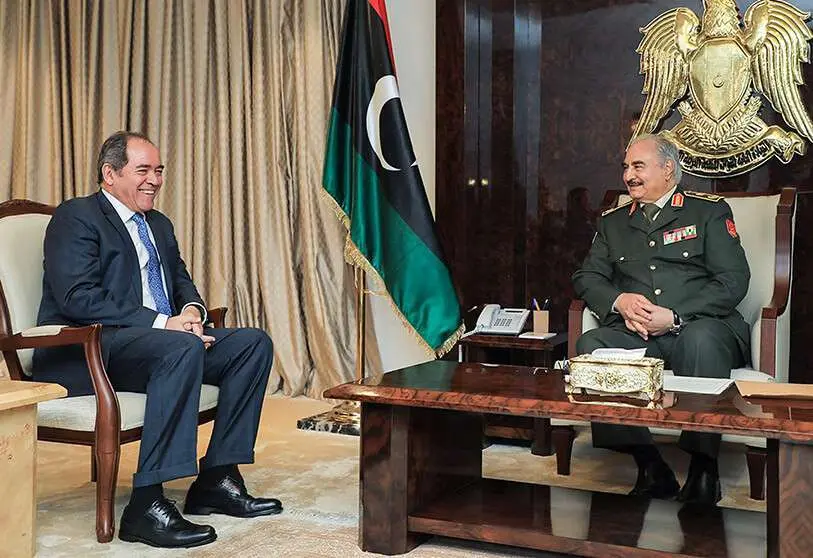Haftar declares border with Algeria a closed military zone

Forces loyal to Libya's eastern commander Khalifa Haftar have closed the border with Algeria, they reported, after major deployments of his forces in the south highlighted the role he continues to play despite efforts to unify the country.
Haftar's Libyan National Army (LNA) last week sent troops to the southern town of Sebha, which was already allied with eastern forces, and then on Saturday to a southern border crossing with Algeria.
"The armed forces have closed the Libyan-Algerian border and declared it a military zone where movement is prohibited," said the Moral Guidance Department, a media unit of the LNA.
The nearly 1,000-kilometer border between Algeria and Libya runs through a largely uninhabited desert where there are few crossings.

Algeria has strengthened its bilateral relations to deal with the insecurity caused by the Libyan conflict and the Sahel. In addition to the troops loyal to Haftar and Sarraj, a number of actors such as organized crime networks and armed militias are involved in the conflict. This situation is exacerbated by the porous borders and the structural insecurity present in the region. All this has favored the emergence of a war economy from which large sectors of the population, organized crime groups or terrorist networks benefit.
This decision, taken by General Haftar, follows the declaration by Algerian President Abdelmajid Tebboune that the Algerian army was preparing to launch an offensive on Libyan territory. During an interview, broadcast June 9 on Al-Jazeera, the Algerian president said he had considered an intervention in Libya because he considered "Tripoli a red line." "We do not accept that the capital of a Maghreb country is occupied by mercenaries. We were going to intervene," Tebboune assured. Asked whether it was a military internment, the president responded by saying that Algeria would have intervened in one "way or another: we were not going to stand idly by."

In parallel, in a new step towards the pacification of Libya: Prime Minister Abdelhamid Dbeiba announced on Sunday the reopening of the coastal road between east and west, closed for about two years during the fighting. The coastal road connects western Libya from the border with Tunisia and eastern Libya with Egypt. It is the stretch between the cities of Misrata (west) and Sirte (center-north), about 300 kilometers long, which had been closed at the beginning of the offensive with which Marshal Jalifa Haftar, the strongman of the east, had tried, unsuccessfully, to conquer the capital Tripoli from April 2019 to June 2020.
However, despite progress towards a political solution for Libya after a decade of violence and chaos, most of the country is still controlled by armed groups, corruption is rampant and outside powers involved in the conflict have not withdrawn.
Progress is expected in the coming days in implementing the terms of a military ceasefire in place since September, with the main coastal road through the front lines expected to reopen.

On June 23, Berlin will host a new conference on Libya, following the one held in January 2020, under the auspices of the UN, with the participation of the transitional government of that country, all the parties involved in the conflict, as well as the countries that support them.
The purpose of the summit is to prepare for national elections and to achieve a lasting cease-fire that will enable the stabilization of the country and the holding of these elections.
Since March, power has been in the hands of the GNU, elected by the Forum for Libyan Political Dialogue (FPLD), an unelected body set up by the UN outside the hitherto warring governments, which is to unify the country, maintain the ceasefire and lead it to the elections.
In the last five years, Libya has become a large smuggling hypermarket and the engine of a circular corsair economy in North Africa and the Sahel that feeds on the illegal sale of fuel, weapons and food, employs thousands of people and has made its coasts the main springboard for irregular migration in the Central Mediterranean, the deadliest migratory route in the world.
The complicated situation in Libya has forced a multitude of actors, from countries to international organizations, to put maximum effort into mediation and the development of forums of all kinds to try to take steps towards a solution to put an end to the conflict. Countries such as Morocco, Tunisia and Egypt have hosted meetings at different levels in recent months, mainly at the military and political level. In Libya, the tangle of interests, dynamics and movements is making it very difficult to develop the talks. In addition, of course, to the interference of third countries such as Turkey or Russia.

In this sense, the Foreign Ministers of Egypt, Sameh Shukri, and Libya, Nadjla Al Mangush, fixed in a meeting held in Libya, a series of points, such as the holding of the Libyan elections scheduled for December or the withdrawal of foreign forces and mercenaries from the African country, in view of the next summit on the Libyan conflict, to be held on the 23rd.
The strong and good relationship between the two states stems from the assistance Egypt offered to Libya to mediate and encourage a ceasefire in the civil war, as well as to promote stability in the country after cooperating on anti-terrorism policies.
"We agreed that it is necessary for the conference to have clear results, to renew the commitment of the international community (...) to the full implementation of the right of elections, the efforts of the departure of foreign forces and mercenaries and to protect the resources of the Libyan people," Shukri said in his speech. For her part, the Libyan minister added that during the meeting they agreed to "put an end to all foreign interventions, unify the (Libyan) military institutions, give continuity to the cease-fire, and support a phase of stability and security in Libya", according to Efe.









